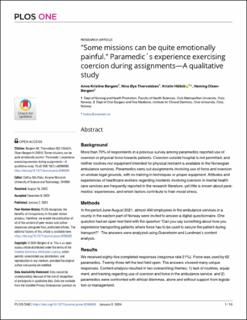"Some missions can be quite emotionally painful." Paramedic´s experience exercising coercion during assignments—A qualitative study
Peer reviewed, Journal article
Accepted version
Permanent lenke
https://hdl.handle.net/11250/3110971Utgivelsesdato
2024Metadata
Vis full innførselSamlinger
Originalversjon
10.1371/journal.pone.0290593Sammendrag
Background
More than 70% of respondents in a previous survey among paramedics reported use of
coercion or physical force towards patients. Coercion outside hospital is not permitted, and
neither routines nor equipment intended for physical restraint is available in the Norwegian
ambulance services. Paramedics carry out assignments involving use of force and coercion
on unclear legal grounds, with no training in techniques or proper equipment. Attitudes and
experiences of healthcare workers regarding incidents involving coercion in mental health
care services are frequently reported in the research literature, yet little is known about para-
medics’ experiences, and which factors contribute to their moral stress.
Methods
In the period June-August 2021, almost 400 employees in the ambulance services in a
county in the eastern part of Norway were invited to answer a digital questionnaire. One
question had an open text field with the question "Can you say something about how you
experience transporting patients where force has to be used to secure the patient during
transport?". The answers were analyzed using Graneheim and Lundman’s content
analysis.
Results
We received eighty-five completed responses (response rate 21%). Force was used by 62
paramedics. Twenty-three left the text field open. The answers showed many unique
responses. Content analysis resulted in two overarching themes; 1) lack of routines, equip-
ment, and training regarding use of coercion and force in the ambulance service, and 2)
paramedics were confronted with ethical dilemmas, alone and without support from legisla-
tion or management.
Conclusions
The paramedics experienced discomfort related to the exercise of force and coercion during
ambulance assignments due to the experience of unclear legislation, lack of training, rou-
tines, and equipment in addition to frequent ethical dilemmas and the concern about lack of
support from the employer. A clearer legal basis, adapted equipment in the ambulance and
regular training, will contribute to greater security in the performance of the work, which will
provide safer and more caring treatment for the patients and less moral stress for the staff.
With established routines, the employer will be implicitly obliged, and paramedics will be
safer in the performance of their work. Ethical reflection must be offered and put into a
system.

